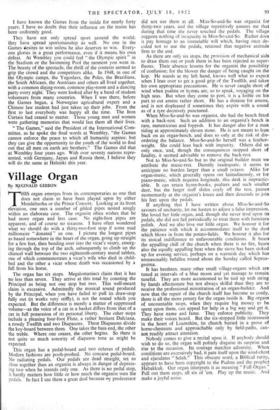Village Organ
By RIEGINALD GIBBON The organ has six stops. Megalomaniacs claim that it has no less than seven. They arrive at this total by counting the Principal as being not one stop but two. This well-meant claim is excessive. Admittedly the musical sound produced by the Principal, when you have failed to pull its draw-stop fully out (it works very stiffly), is not the sound which you expected. But the difference is merely a matter of suppressed volume—as the voice of a cat in a basket differs from that of a cat in full possession of its personal liberty. The other stops include a pleasing four-foot Flute, a rather hesitant Dulciana, a rowdy Twelfth and two Diapasons. These Diapasons divide the key-board between them. One takes the bass end, the other the treble. Where one ceases, the other begins. So there is not quite so much sonority of diapason tone as might be expected.
This organ has a pedal-board and two octaves of pedals. Modern fashions are pooh-poohed. No concave pedal-board. No radiating pedals. Our pedals are dead straight, set so close together than an organist is always in danger of depress- ing two when he intends only one. As there is no pedal stop, it hardly matters how little or how much the organist uses the pedals. In fact I use them a great deal because 14y predecessor did not use them at all. Miss-So-and-So was organist for thirty-two years, and the village repetitively assures me that during that time she never touched the pedals. The village suggests nothing of incapacity in Miss-So-and-So. Rather does it pay homage to an immutable will which, having once de- cided not to use the pedals, retained that negative attitude firm to the end.
As there are only six stops, the provision of mechanical aids to draw them out or push them in has been rejected as super- fluous. Their absence lessens for the organist the possibility of confusion; for the blower the danger of being caught on the hop. He stands at my left hand, knows well what to expect when I lean over to get a good grip of the Twelfth, and takes his own appropriate precautions. He is never caught short of wind when psalms or hymns are, so to speak, voyaging on the high seas. But when they come to port, it is a foible on his part to cut amens rather short. He has a distaste for amens, and is not displeased if sometimes they expire with a sound as of a tyre decisively punctured.
When Miss-So-and-So was organist, she had the bench fitted with a back-rest. Such an addition to an organist's bench is rare, meretricious and foppish. It has danger also for a man riding at approximately eleven stone. He is not meant to lean • back on an organ-bench, and does so only at the risk of dis- ordering the balance. Miss-So-and-So herself was a feather- weight. She could lean back with impunity. Others did so only once, •and, though the consequences stopped short of fatality, it seemed advisable to remove the back-rest.
Not to Miss-So-and-So but to the original builder must we attribute the music-rest. Daintily inadequate, it seems to anticipate no burden larger than a small octavo. Alike for organ-Inusic, which generally opens out latitudinously, or for piano-music, which requires longitude, this desk is impractic- able. It can retain hymn-books, psalters and such smaller deer, but the larger stuff slides coyly off the rest, pauses momentarily at the organist's knees and then descends to join his feet upon the pedals.
If anything that I have written about Miss-So-and-So savours of uncharity, let me hasten to adjust a false impression. She loved her little organ, and, though she never trod upon its pedals, she did not fail periodically to treat them with furniture polish. And we also love our little organ. We honour it for the patience with which it accommodates itself to the dust which blows in from the potato-fields. We honour it also for its stoical indifference to unfavourable conditions. It bears the appalling chill of the church when there is no fire, bears also the equally appalling heat when the stove has been stoked up for evening service, perhaps on a warmish day which has unseasonably befallen round about the Sunday called Septua- gesima. It has brethren, many other small village-organs which are tuned at intervals of a blue moon and yet manage to remain tuneful. They are more accustomed to be tied up with string by hands affectionate but not always skilful than they are to receive -the professional ministration of an organ-builder. And now that the repair of the church itself has become so costly, there is all the more penury for the organ inside it. Big organs of uncountable stops, when they require big money to be spent upon them, can appeal for help in a big way and get it. They have name and fame. They enforce publicity. They make their voices heard. But the six-stopped little instrument in the heart of Loamshire, its church buried in a grove of horse-chestnuts and approachable only by field-paths, can- not readily attract attention. Nobody comes to give a recital upon it. If anybody should wish to do so, the organ will politely disguise its surprise and rise to the occasion. Its courage matches adversity. When conditions are excessively bad, it pats itself upon the wind-chest and ejaculates " Selah." This obscure word, a Biblical rarity, appears to have been copyright to the Psalms and the prophet Habakkuk. Our organ interprets it as meaning "Full Organ." Pull out them stops, all six of 'em. Play up the music. And make a joyful noise.


































 Previous page
Previous page